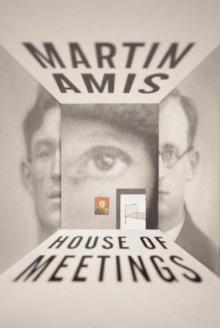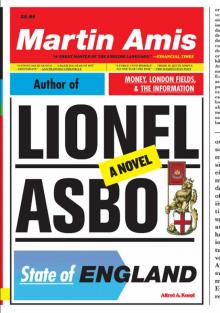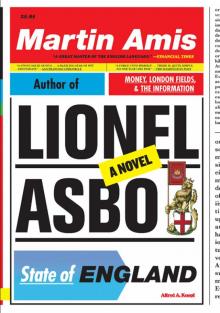- Home
- Martin Amis
The Pregnant Widow Page 3
The Pregnant Widow Read online
Page 3
He listened to this. Lily’s announcement had left him bereaved, orphaned. That was what it meant: from Gk orphanos “bereaved.” Keith was actually born bereaved. And the suspicion that this would remain his natural state was clearly far too readily available to him. Desolate: from L. desolare “abandon,” from de- “thoroughly” + solus “alone.” He listened to Lily—and of course he knew it already. Something was churning in the world of men and women, a revolution or a sea change, a realignment having to do with carnal knowledge and emotion. Keith did not want to be an anachronism. And I think I can say that this was his first attempt at character management: he decided to get better at not falling in love.
If we don’t like it, we can always … I want to act like a boy for a while. And you can just go on as you are.
Thus Lily had her hair restyled, and bought lots of miniskirts and cut-off culottes and halter tops and see-through blouses and knee-length patent-leather boots and hoop earrings and kohl eyeliner and all the other things you needed before you could act like a boy. And Keith just stayed the same.
He was better placed than her, in a way: he had some experience of acting like a boy. Now he took it up again. Pre-Lily, before Lily, he often encountered a difficulty more associated with acting like a girl: his emotions. And he didn’t always see things clearly. He got it completely wrong, for instance, about what everyone was calling free love—as a succession of horrified hippies could quietly attest. He thought it meant what it said; but it wasn’t love that was on offer from the mushroompale flower-daughters of the capital, with their charts, tarot cards, and Ouija boards. Some girls were still saving themselves for marriage; some were still religious—and even the hippies were only very slowly going secular …
After Lily, post-Lily, the new rules of engagement seemed more firmly emplaced. The year was 1970, and he was twenty: to this historic opportunity he brought his minimal handsomeness, his plausible tongue, his sincere enthusiasm, and a certain willed but invigorating coldness. There were disappointments, near things, there were some miraculous acquiescences (which still felt like liberties, in the shame-and-honour sense: involving impudence, overfamiliarity, taking advantage). Anyway, the free-love business certainly worked best with girls who were acting like boys. New rules—and new and sinister ways of getting everything wrong. He acted like a boy, and so did Lily. But she was a girl, and could do more of it than he could.
Come with me, said Lily, three months later on the phone, come with me to Italy for the summer. Come with me to a castle in Italy with Scheherazade. Please. Let’s have a holiday from it. You know, there are people out there who don’t even try to be kind.
Keith said he would call her back. But almost at once he felt his head give a sudden nod. He had just spent a night of almost artistic misery with an ex-girlfriend (her name was Pansy). He was frightened and bruised and, for the first time, obscurely but intensely guilty; and he wanted to return to Lily—to Lily, and her middleworld.
How much will it cost?
She told him. And you’ll need spending money for when we go out. The thing is, I’m no good at being a boy.
All right. And I’m glad. I’ll start borrowing and saving up.
His ridiculous row with Lily. She blamed him, basically, for confusing and therefore corrupting Violet with Christianity when she was a little girl. Which was true enough as far as it went. I tried to de-convert her when she was nine, he explained. I said, God is just like Bellgrow: your imaginary friend. And yet she stuck with it. Lily said, And you’d think religion would make her behave. And it’s had the opposite effect. She’s sure she’ll be forgiven for everything because she believes in a fool in the sky. And it’s all your fault.
Lily was of course an atheist—an open-and-shut atheist. Keith argued that this position wasn’t quite rational; but then Lily’s rationalism wasn’t rational in the first place. She hated astrology, naturally, but she hated astronomy too: she hated the fact that light bent, that gravity slowed down time. She was especially exasperated by the behaviour of subatomic particles. She wanted the universe to behave sensibly. Even Lily’s dreams were quotidian. In her dreams (this was rather shyly disclosed), she went down the shops, or washed her hair, or had a snack for lunch while she stood by the fridge. Openly suspicious of poetry, she had no patience with any work of fiction that strayed from the sternest social realism. The only novel she unreservedly praised was Middlemarch. Because Lily was a creature of the middleworld.
Come with me to a castle in Italy with Scheherazade. It should be said that the Scheherazade section of Lily’s proposal, so far as Keith was concerned, was neither here nor there. Scheherazade, when he last saw her, around Christmas, was as usual the frowning philanthropist in flatties and spectacles; she did community service, and CND and VSO, and drove a van for Meals on Wheels; and she had a loose-limbed boyfriend called Timmy, who liked killing animals and playing the cello and going to church. But then Scheherazade awoke from troubled dreams.
Keith was assuming that social realism would hold, here in Italy. And yet Italy itself seemed partly fabulous, and the citadel they occupied seemed partly fabulous, and the transformation of Scheherazade seemed partly fabulous. Where was social realism? The upper classes themselves, he kept thinking, were not social realists. Their modus operandi, their way of operating, obeyed looser rules. He was, ominously, a K in a castle. But he was still assuming that social realism would hold.
Does she still do all that stuff with the old wrecks?”
“… Yes, she does. She misses it.”
“Where’s her bloke, anyway? Where’s ‘Timmy’? And when’s he coming?”
“That’s what she wants to know. She’s quite cross with him. He’s supposed to be here by now. He’s in Jerusalem doing God knows what.”
“… Her mum’s the one I fancy. Oona. Nice and little.” He thought about Pansy. And thinking about Pansy necessarily involved him in thinking about her mentor, Rita. So he said, “Uh, Lily. You know I said Kenrik may be coming down this way. He’s going camping with the Dog. Sardinia, supposedly.”
“What’s the Dog’s real name? Is it Rita? … Describe.”
“Well. From up north. Rich working-class. Very big eyes. Very wide mouth. A redhead. And no curves at all. Like a pencil. Could we put them up for a night, Kenrik and Rita?”
“I’ll ask Scheherazade. And I’m sure we can make room,” she said, yawning, “for a nice titless ginge from up north. I’ll look forward to it.”
“You’ll marvel at her. She’s a real expert at acting like a boy.”
Lily turned on her side, making herself smaller, wholer, more complete and compressed. He always felt for her when she did this, and he followed the relays of her jolts and twitches, these tiny surprises on the way to oblivion. How could she find it, without embracing the irrational? … Lily sometimes liked to hear his voice as she trembled off, into the religion of sleep (he usually summarised the novels he was reading), so he moved up close, saying,
“There’ll be enough novels later. Listen. The very first girl I ever kissed was taller than me. Probably just a few inches but it felt like about a yard. Maureen. We were at the seaside. I’d already kissed her in the bus shelter, sitting down, and I had no idea how we were going to kiss goodnight. But there was a drainage pipe on the ground by her caravan, and I stood on that. Nice kisses. No tongues or anything. We were too young for tongues. It’s important not to do things you’re too young for. Don’t you think?”
“Scheherazade,” said Lily thickly. “Get her near a drainage pipe.” Then, more clearly, “How, how could you not be in love with her? You fall in love so easily and she’s … Goodnight. I sometimes wish …”
“Goodnight.”
“You. Such a slag for love.”
When we wake up in the morning (he thought), it’s the first task that lies ahead of us: the separation of the true from the false. We have to dismiss, to erase the mocking kingdoms made by sleep. But at the close of the day it was the o
ther way round, and we sought the untrue and the fictitious, sometimes snapping ourselves awake in our hunger for nonsensical connections.
It was true what she said, or it used to be. Slag for love. To do with his peculiar provenance. He fell in love with girls so easily—and he went on loving them. He still loved Maureen: he thought of her every day. He still loved Pansy. Is that why I’m here? he wondered. Is that why I’m here with Lily in the castle in Campania? Because of the tragic night with Pansy, what it said, what it meant? Keith closed his eyes and searched for troubled dreams.
The dogs in the valley barked. And the dogs in the village, not to be outdone, barked back.
Just before dawn he went up and smoked a cigarette on the watchtower. The day was coming in like a current. And there it was suddenly, over the flank of the massif, God’s red rooster.
3
POSSIBILITY
We are trapped by the truth, and the truth was that it all built very slowly …
“There’s one boring thing,” Scheherazade said on the first afternoon as she led him up the tower.
But it wasn’t boring yet. For some fifteenth-century reason, the steps were bracingly steep, and on the half-landings, when she swivelled, Keith could see up her skirt.
“What’s that?”
“I’ll show you when we get to the top. We’ve got a while to go. It’s endless.”
High-mindedly, Keith averted his gaze. Then he looked. Then he looked away (and beheld, through the slit in the stone wall, a pale horse with its flanks shuddering). He looked, and looked away—until, with an audible click of the neck, he locked into position and went ahead and looked. How was it that he had never taken due note of this—the beauty, power, wisdom, and justice of women’s thighs?
Scheherazade said over her shoulder, “Are you a great seer of sights?”
“I’m on for anything.”
“What, mad keen?”
He already seemed to be in a film—a salacious thriller, perhaps—in which every line of intersexual dialogue was an irresistibly smutty pun. They kept climbing. Now he searched for a single entendre. “Keen enough. I’ve got all this reading to do,” he said. “Catching up. Clarissa. Tom Jones.”
“Poor you.”
For the record, Scheherazade’s lower undergarment was workaday and pale brown (rather like the kind of pants Lily used to wear—before). As against that, its hem was loosely neglectful of the right buttock, providing a slice of white in the crux of all that churning bronze. She said,
“There’s talk of the Passo del Diavolo.”
“What’s that?”
“The Devil’s Pass. Very twisty and scary. So I’m told. Right. Now you two are in this turret. And I’m in that turret.” She gestured on down the passage. “And we share the bathroom in between. That’s the boring thing.”
“… Why’s it boring?”
“Lily refuses to share a bathroom with me. We’ve tried it. I’m just too messy. So she’ll have to go halfway down the tower and turn right. But I don’t see why you should. Unless you’ve got a thing about messiness too.”
“I haven’t got a thing about messiness.”
“Look.”
The skylit bathroom was long and narrow and L-shaped, its left-hand turn presided over by a burnished towel rack and two wall-sized mirrors. They moved through it. Scheherazade said,
“We share. So here’s the drill. When you come in from your room, you lock the door to my room. And when you leave you unlock it. And I do the same … This is me. God I’m a slob.”
He took it in, the white nightdress aslant the tousled bed, the heaps of shoes, the pair of starched jeans, trampled out of, all agape, but still on its knees and still cupping the form of her waist and hips.
“It always staggers me,” he said. “Girls’ shoes. Girls and shoes. So many. Lily’s brought a whole suitcaseful. Why are girls like that about shoes?”
“Mm, well, I suppose the feet are the only bit of you that can’t possibly be pretty.”
“You think that’s it?”
They looked down at the ingenuous occupants of Scheherazade’s flip-flops: the curve of the insteps, the visible flex of the ligaments, the ten daubs of crimson in five different sizes. He always found it affecting—that girls bothered with that dot on the outer toe. The pinkie toe, like the runt of the litter. But you couldn’t neglect it, obviously—each little piggie needed its red beret. He said,
“You have pretty feet.”
“Not too bad.” The ten toes gave a self-conscious ripple. “As feet go. Feet. They’re such dumb-looking things.”
“I suppose. Some people claim it’s quite complicated. Girls and feet. May I?” He picked up the left-sided representative of a pair of shoes he knew to be characterised as court. “What could look less like a foot than that?” He meant the degree of stylisation or contrivance. “With that arch and that heel.”
“Mm. Feet. And to think some people have a fetish about feet.”
“Imagine what that says about you.”
“Terrifying. It’s very easy,” she said, as they came back through the already significant bathroom, “to forget to unlock. Everyone does it all the time. There’s even a little bell—see? If I’m locked out, I ring it.” She rang it: a soft but determined purr. “You’ve got one too. I always forget. Which is boring of me.”
Scheherazade gazed his way with her peculiar directness, the golden, idealistic eyes, the very level brows. When that look fell on Keith, he had the feeling that she had already dealt with every matter concerning him—birth, background, appearance, even stature. Important, too (he disconnectedly thought), was the fact that she called her mother Mum, and not Mummy (like all the other female members of her class). This spoke to Keith of her essentially egalitarian soul. But the strangest thing about Scheherazade was her smile, which was not the smile of a beautiful girl. There was too much collusion in the softly rippled lids—collusion in the human comedy. The smile of a beautiful girl was a sequestered smile. It hasn’t sunk in yet, said Lily. She doesn’t know. And could that really be? Keith said to Scheherazade,
“I’m not easily bored. Nothing’s boring. Looked at in the right way.”
“Oh I know that line,” she said. “If it’s boring, it’s interesting because it’s boring.”
“That’s right. Being boring’s interesting.”
“And it’s interesting that nothing’s boring.”
Aren’t they nice, the young? They’ve stayed up till dawn for two years drinking instant coffee together, and now they’re opinionated—they have opinions.
“Still,” she said, “repetition’s boring. Come on, it is. Like this weather. Sorry about that.”
“Never apologise for the weather.”
“Well I want to swim and sunbathe. And it’s rainy. And it’s almost cold … But at least it’s sweaty.”
“At least it’s sweaty. Thank you for having me. It’s fabulous here. I’m entranced.”
Keith knew of course that the psychological meaning of feet was itself twofold. These brutal trotters were a permanent reminder of your animality, your unforgiven, non-angelic status as a human being. They also performed the menial task of connecting you to solid ground.
So here was the castle, its battlements kept aloft on the shoulders of the four fat-girthed giants, the four towers, the four terraces, the circular ballroom (with its orbital staircase), the domed pentagonal library, the salon with its six sets of windows, the baronial banqueting hall at the far end of the implausibly and impractically long corridor from the barnyard-sized kitchen, all the antechambers which receded, like facing mirrors, into a repetitive infinity. Above was the apartment (where Oona spent almost all her time); below was the dungeon floor, half submerged in the foundational soil, and giving off the thinnest mist of what smelled to Keith like cold sweat.
“There’s an old word for the way she regards you, Scheherazade,” he said to Lily in the pentagonal library. He was up on a ladder, almost at dome level. �
�You’ll think it just means being patronising. But it’s a term of praise. And humble gratitude. Condescension, Lily.” From eccles. L., from con- “together” + descendere “come down” (“together” was the important part). “Her being a Lady and all.”
“She’s not a Lady. She’s an Honourable. Her dad was a viscount. You mean she treats you,” said Lily, “for all the world as if you aren’t a berk.”
“Yeah.” He was talking about the class system. But he was thinking about the looks system—the beauty system. Would there ever be a revolution in looks, where those who were last would now be first? “I suppose that’s about the size of it.”
“And you only give the nobs praise and gratitude because you know your proper place. You’re a good berk.”
Keith wouldn’t like you to think that he was forever oiling up to the girls of the aristocracy. In recent years (I should point this out) he had spent the vast majority of his spare time oiling up to the girls of the proletariat—and then the girls, or the girl, of the professional intelligentsia (Lily). Of the three strata, working-class girls were the most puritanical. Upper-class girls, according to Kenrik, were the most promiscuous, the fastest, as they themselves put it, faster even than the girls of the middle class, who, of course, would soon decisively outspeed them … He returned to the leather-decked davenport, where he was reading Clarissa and taking notes. Lily was on a chaise longue, and had before her something called Interdiction: On Our Law and Its Study. He said,
“Ooh, you didn’t like that, did you. Dear oh dear.”
“You’re a sadist,” said Lily.
“No I’m not. You’ll notice that I have no quarrel with other insects. Not even wasps. And I actually admire spiders.”
“You tramped down to the village to get the spray. What’s wrong with the swat?”
“It leaves a horrible smear when you use the swat.”
The fly he had just fatally drenched was now stretching its back legs, like an old dog after a long nap.

 Other People
Other People The Zone of Interest
The Zone of Interest The Rub of Time: Bellow, Nabokov, Hitchens, Travolta, Trump
The Rub of Time: Bellow, Nabokov, Hitchens, Travolta, Trump Koba the Dread
Koba the Dread Success
Success London Fields
London Fields Heavy Water: And Other Stories
Heavy Water: And Other Stories Money
Money The Moronic Inferno and Other Visits to America
The Moronic Inferno and Other Visits to America Yellow Dog
Yellow Dog Time's Arrow
Time's Arrow Experience: A Memoir
Experience: A Memoir Einstein's Monsters
Einstein's Monsters The Pregnant Widow
The Pregnant Widow House of Meetings
House of Meetings The Information
The Information Lionel Asbo: State of England
Lionel Asbo: State of England Lionel Asbo
Lionel Asbo Heavy Water and Other Stories
Heavy Water and Other Stories Night Train
Night Train Heavy Water
Heavy Water The War Against Cliche: Essays and Reviews 1971-2000 (Vintage International)
The War Against Cliche: Essays and Reviews 1971-2000 (Vintage International)